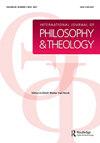论海德格尔的艺术创作与谢林的神性创作的契合
IF 0.3
0 PHILOSOPHY
International Journal of Philosophy and Theology
Pub Date : 2022-05-27
DOI:10.1080/21692327.2022.2128857
引用次数: 0
摘要
当代大多数关于谢林和海德格尔的文献都集中在这两位哲学家之间的直接联系上——海德格尔与谢林的《自由》论文的接触。然而,本文通过阅读谢林的《世界时代》和海德格尔的《艺术作品的起源》,探讨了他们之间在创作主题上的隐含联系。将谢林的上帝创造与海德格尔的艺术创造结合在一起,认为两者在结构、来源和目的上具有相似性:两者的创造都依赖于双重斗争,来源要么是绝对(谢林),要么是存在(海德格尔),目的是揭示世界上的神圣原则(谢林),要么是存在的真理(海德格尔)。在进行这些比较时,我认为,尽管海德格尔有深奥的新词,但他对艺术创造的描述并不像他自己声称的那样彻底新颖。根据谢林的创造形而上学,更广泛地说,根据一般哲学史,可以更好地阅读和理解它。最终,海德格尔的哲学仍然致力于哲学神学的传统,尽管他自己试图超越这一传统。本文章由计算机程序翻译,如有差异,请以英文原文为准。
The affinity between artistic creation in Heidegger and divine creation in Schelling
ABSTRACT The majority of the contemporary literature on Schelling and Heidegger focuses on the direct connection between the two philosophers – Heidegger’s engagement with Schelling’s Freedom essay. This paper, however, explores an implicit link between them on the topic of creation by reading Schelling’s Ages of the World alongside Heidegger’s ‘The Origin of the Work of Art’. It brings God’s creation in Schelling together with artistic creation in Heidegger and argues that the two have similarities in their structures, sources, and aims: both creations are dependent on a two-fold struggle, the sources are either the absolute (in Schelling) or being (in Heidegger), and the aims are to reveal the divine principle (in Schelling) or the truth of being (in Heidegger) in the world. In making these comparisons, I argue that, in spite of Heidegger’s esoteric neologisms, his account of artistic creation is not as radically new as he himself claims. It can be read and better comprehended in the light of a Schellingian metaphysics of creation and, more broadly, in the light of the history of philosophy in general. Eventually, Heidegger’s philosophy remains committed to the tradition of philosophical theology, despite his own attempt to move beyond this tradition.
求助全文
通过发布文献求助,成功后即可免费获取论文全文。
去求助
来源期刊

International Journal of Philosophy and Theology
PHILOSOPHY-
CiteScore
0.30
自引率
0.00%
发文量
12
期刊介绍:
International Journal of Philosophy and Theology publishes scholarly articles and reviews that concern the intersection between philosophy and theology. It aims to stimulate the creative discussion between various traditions, for example the analytical and the continental traditions. Articles should exhibit high-level scholarship but should be readable for those coming from other philosophical traditions. Fields of interest are: philosophy, especially philosophy of religion, metaphysics, and philosophical ethics, and systematic theology, for example fundamental theology, dogmatic and moral theology. Contributions focusing on the history of these disciplines are also welcome, especially when they are relevant to contemporary discussions.
 求助内容:
求助内容: 应助结果提醒方式:
应助结果提醒方式:


